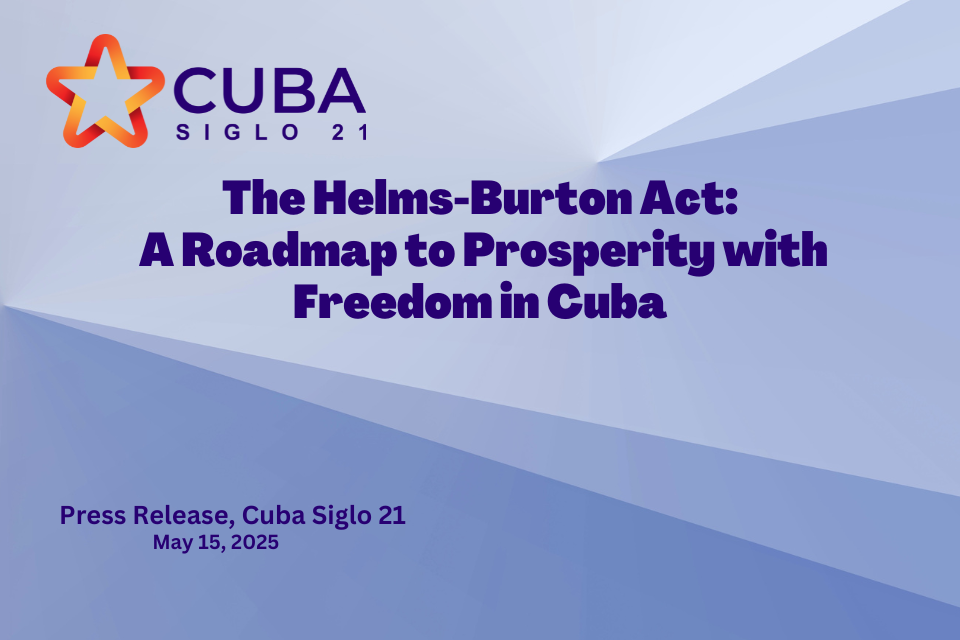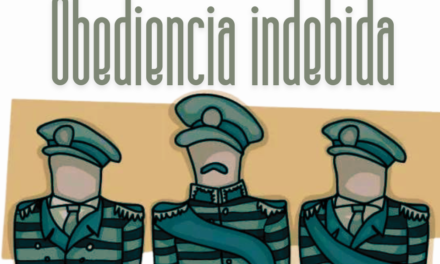Descargar reporte completo pdf en español
Download Report pdf in English
Resumen en español
Summary in English
May 15, 2025 -Title II of the Helms-Burton Act contains a comprehensive roadmap for a non-violent transition to democracy on the island, according to the Dossier published by Cuba Siglo 21, “La Ley Helms-Burton, deal para el cambio” (The Helms-Burton Act, deal for change).
The author, Juan Antonio Blanco, explains that this takes on special relevance now that there are indications that the active measures and U.S. sections of the Intelligence Directorate (DI) of the Cuban Ministry of the Interior (MININT) – together with a group of “organic intellectuals” – are working on the design of a “change fraud” or false opening that, if necessary, could be “sold” to current Administration.
Its strategic purpose is that the supposed opening can be claimed by President Donald Trump as his own victory. By falling into such a trap Trump would barely bless an economic modernization of the current totalitarian model and the mafia in power would not lose its autocratic control over Cuban society.
Passed in 1996 with broad bipartisan support in the U.S. Congress, the Cuban Liberty and Democratic Solidarity Act – better known as the Helms-Burton Act – establishes in Title II the basic conditions for regime change in Cuba toward prosperity with freedom
Title II states that if a transitional government is formed in Cuba that frees political prisoners, respects civil liberties and calls for free elections, the United States will offer:
- Immediate humanitarian relief, including food, medicine and energy assistance.
- Technical assistance for institutional, economic and judicial reforms.
- Support to the Armed Forces for their integration in a new democratic stage.
But once free elections are held and the first democratically elected government is installed, it is contemplated:
- The total lifting of the embargo.
- Washington’s support to access international funds from the World Bank and the Inter-American Development Bank.
- U.S. direct investments guaranteed by federal agencies.
- Full trade relations, which could evolve into “favored nation” status and include eventual participation in a free trade zone with the United States.
Contrary to the narrative promoted from Havana, the Law does not currently prohibit the trade of food or medicines with the Cuban State and would also allow transactions with a real private sector the day it would exist, a possibility that the regime continues to block to this day.
Recent U.S. court decisions in favor of Title III lawsuits filed by former owners whose property was confiscated without compensation -such as the Expedia case- demonstrate that Helms-Burton is still in force. But its real future potential lies not exclusively in the sanctions endorsed in Title III, but in the clauses of Title II that offer a road map for a non-violent transition towards the democratic and economic reconstruction of Cuba, with the commitment of the United States to accompany it in this endeavor.
According to the author, “Helms-Burton does not demand revenge or punishment, nor does it promote violence” and offers an option to finance the reconstruction of a “free, prosperous and democratic nation” because it would be economically supported by the United States.
Finally, Blanco urges FAR and MININT members, administrative officials and even leaders at some level “who do not want to be compromised at the last minute in the futile attempt to sustain that mafia in power” to “hurry up in making decisions”.
The thesis of the Dossier is clear: the only proposal for an agreement or deal from the United States to the Cuban people has already been approved by Congress and is still in force. It is not advisable to elaborate or negotiate a new deal with the Cuban power elite that, under other modalities, would facilitate the prolongation of its control over the country and society on the island.
The current deal for change in Cuba was passed in March 1996 and is called the Cuban Liberty and Democratic Solidarity or Freedom Act (Helms-Burton Act). What has been lacking so far is an administration in Washington willing to push for it with firmness, creativity and persistence. Something that President Trump could now do.







